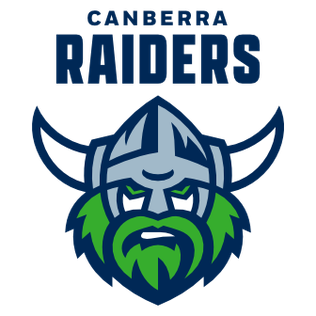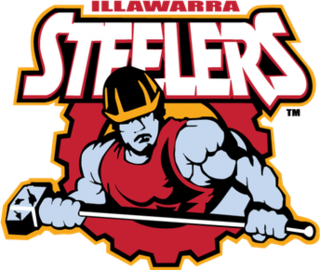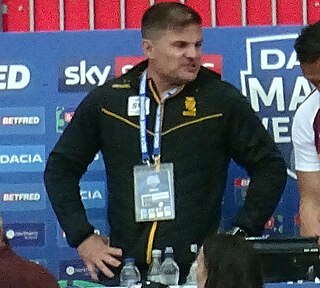
The Canberra Raiders are an Australian professional rugby league football club based in the national capital city of Canberra, Australian Capital Territory. They have competed in Australasia's elite rugby league competition, the National Rugby League (NRL) premiership since 1982. Over this period the club has won three premierships out of six Grand Finals, the last one played being the 2019 NRL Grand Final, resulting in a 14-8 controversial loss to the Sydney Roosters. Canberra currently have the second longest active premiership drought in the NRL totalling 30 years. The Raiders' current home ground is Canberra Stadium in Bruce. Previously, the team played home matches at Seiffert Oval in Queanbeyan, New South Wales, with the move to the Canberra Stadium in Bruce taking place in 1990. The official symbol for the Canberra Raiders is the Viking. The Viking, also a mascot at Raiders' games, is known as Victor the Viking.

Canberra Stadium, commercially known as GIO Stadium Canberra, is a facility primarily used for rugby league and rugby union games, located adjacent to the Australian Institute of Sport in Canberra, the capital of Australia. It is the largest sports venue by capacity in Canberra.

The Cronulla-Sutherland Sharks are an Australian professional rugby league club based in Cronulla, in the Sutherland Shire, Southern Sydney, New South Wales. The Cronulla Sharks compete in the National Rugby League (NRL), Australasia's premier rugby league competition. The Sharks, as they are commonly known, were admitted to the New South Wales Rugby League premiership, predecessor of the Australian Rugby League and the current National Rugby League competition, in January 1967. The club competed in every premiership season since then and, during the Super League war, joined the rebel competition before continuing on in the re-united NRL Premiership. The Sharks have been in competition for 56 years, appearing in four grand finals, winning their first premiership in 2016 after defeating the Melbourne Storm at Stadium Australia.
The St. George Dragons are an Australian rugby league football club from the St George District in Sydney, New South Wales that played in the top level New South Wales competition and Australian Rugby League competitions from the 1921 until the 1997 ARL season, as well as the unified 1998 National Rugby League season. On 23 September 1998, the club formed a joint venture with the Illawarra Steelers, creating the St. George Illawarra Dragons team which competed in the 1999 NRL season and continues to compete in the league today. As a stand-alone club, it fields teams in the NSWRL underage men's and women's competitions, Harold Matthews Cup, S.G. Ball, and Tarsha Gale Cup.

The Illawarra Steelers are an Australian rugby league football club based in the city of Wollongong, New South Wales. The club competed in Australia's top-level rugby league competition from 1982 until 1998. On 13 December 1980, they were the first non-Sydney based team to be admitted into the New South Wales Rugby League premiership, with the Canberra Raiders being admitted later ensuring an even number of teams in the competition for the start of their first season, 1982. Over their seventeen years in the top grade, the club received three wooden spoons, made the play-offs twice and had a total of three of its players selected to play for the Australia national rugby league team.

The Adelaide Rams was an Australian professional rugby league football club based in Adelaide, South Australia. The team was formed in 1995 for the planned rebel Super League competition. The Rams lasted two seasons, the first in the Super League competition in 1997 and the second in the first season of the National Rugby League (NRL) in 1998. The Rams were not a successful club, winning only 13 out of 42 games. However crowd numbers in the first season were the fifth highest of any first-grade club that year, but dwindled to sixteenth in the second season. The Adelaide club was shut down at the end of the 1998 season as a result of poor on-field performances, dwindling crowd numbers, financial losses and a reduction in the number of teams in the NRL. They remain the only team from the state of South Australia to have participated in top-level rugby league in Australia.

NRL Western Australia is responsible for administering the game of rugby league football in the state of Western Australia.

Parramatta Stadium was a sports stadium in Parramatta, New South Wales, Australia, 24 km (15 mi) west of Sydney CBD. The stadium was the home ground of several western Sydney-based sports teams, at the time of closure the most notable were the Parramatta Eels of the National Rugby League and the Western Sydney Wanderers of the A-League.

The St. George Illawarra Dragons are an Australian professional rugby league football club, representing both the Illawarra and St George regions of New South Wales. The club has competed in the National Rugby League (NRL) since 1999 after a joint-venture was formed between the St. George Dragons and the Illawarra Steelers. The club officially formed as the game's first joint-venture club on 23 September 1998 and remains the only inter-city team in the NRL. The team has its headquarters and leagues clubs in both Wollongong and the Sydney suburb of Kogarah, and trains and plays games regularly at WIN Stadium in Wollongong, as well as at Jubilee Oval in Kogarah. From 1999 to 2006 the club was jointly owned by the St. George Dragons 50% and Illawarra Steelers 50%. In 2006 WIN Corporation purchased 50% of the Illawarra Steelers stake in the club before purchasing the rest of the Illawarra Steelers' share in August 2018.

Australian rules football has been played continuously in the Australian Capital Territory since 1911 and was the most popular football code in the nation's capital Canberra between 1978 and 1982. The current governing body is AFL Canberra founded 1922, while the development body is AFL NSW/ACT established in 1999.

Simon Woolford is an Australian professional rugby league coach who was most recently the head coach of the Huddersfield Giants in the Super League, and a former professional rugby league footballer.

Brent Kite is a former professional rugby league footballer who played in the 1990s, 2000s and 2010s. A Tonga and Australia international, and New South Wales State of Origin representative front-row forward, he played club football for the St. George Illawarra Dragons, Manly Warringah Sea Eagles and Penrith Panthers. Kite was named the Clive Churchill Medallist for his performance in the 2008 NRL Grand Final, in which he helped steer Manly-Warringah to a 40–0 thumping of the Melbourne Storm, scoring a try.
David Furner is an Australian professional rugby league football coach who was the head coach of the Leeds Rhinos, and a former player. He is an assistant coach for the South Sydney Rabbitohs in the NRL, and the former head coach of the Canberra Raiders with whom he spent his whole Australian playing career. A New South Wales State of Origin and Australia national representative goal-kicking second-row forward, he left the Raiders as the third greatest point-scoring forward in NRL history before enjoying a successful career in England with the Wigan Warriors and the Leeds Rhinos.
The 1987 NSWRL season was the 80th season of professional rugby league football in Australia. Thirteen clubs competed for the New South Wales Rugby League premiership's J J Giltinan Shield and Winfield Cup during the season, which culminated in the grand final between the Manly-Warringah Sea Eagles and the Canberra Raiders who were the first club ever from outside Sydney to appear in a premiership decider. This season, NSWRL teams also competed for the 1987 National Panasonic Cup.
The 2008 National Rugby League season consisted of 26 weekly regular season rounds, starting on 14 March, followed by four weeks of play-offs, culminating in a Grand Final on 5 October.
The 2009 NRL season was the 102nd season of professional rugby league football club competition in Australia, and the twelfth run by the National Rugby League. For the third consecutive year, sixteen teams competed for the 2009 Telstra Premiership title. The season commenced with the first match played on 13 March and ended with the grand final, played on 4 October. The Grand Final was won by the Melbourne Storm in their fourth consecutive grand final appearance. However, they were stripped of their Premiership on 22 April 2010 after they were found to be guilty of breaching the league's salary cap.
The History of the Canberra Raiders Rugby League Football Club began with their establishment in 1982. Along with the Illawarra Steelers, they became the first clubs from outside the Sydney area in over half a century to compete in the New South Wales Rugby Football League premiership. The Raiders have competed in every season of top-level rugby league in Australia since then and have won a total of three premierships: 1989, 1990 and 1994.
Craig Dimond is an Australian former professional rugby league footballer who played in the 1980s and 1990s. He played his club football career for the Illawarra Steelers, Cronulla-Sutherland Sharks and Canberra Raiders. He is the son of Peter Dimond, nephew of Bobby Dimond, both Australian former rugby league test players, and father of Australian Idol contestant Amali Dimond.
Phil Carey is an Australian former professional rugby league footballer who played in the 1980s and 1990s. He played for the Canberra Raiders, Manly-Warringah and Featherstone Rovers.
Michael Twigg is an Australian former professional rugby league footballer who played in the 1980s and 1990s. He played for the Canberra Raiders in the New South Wales Rugby League (NSWRL) competition.











